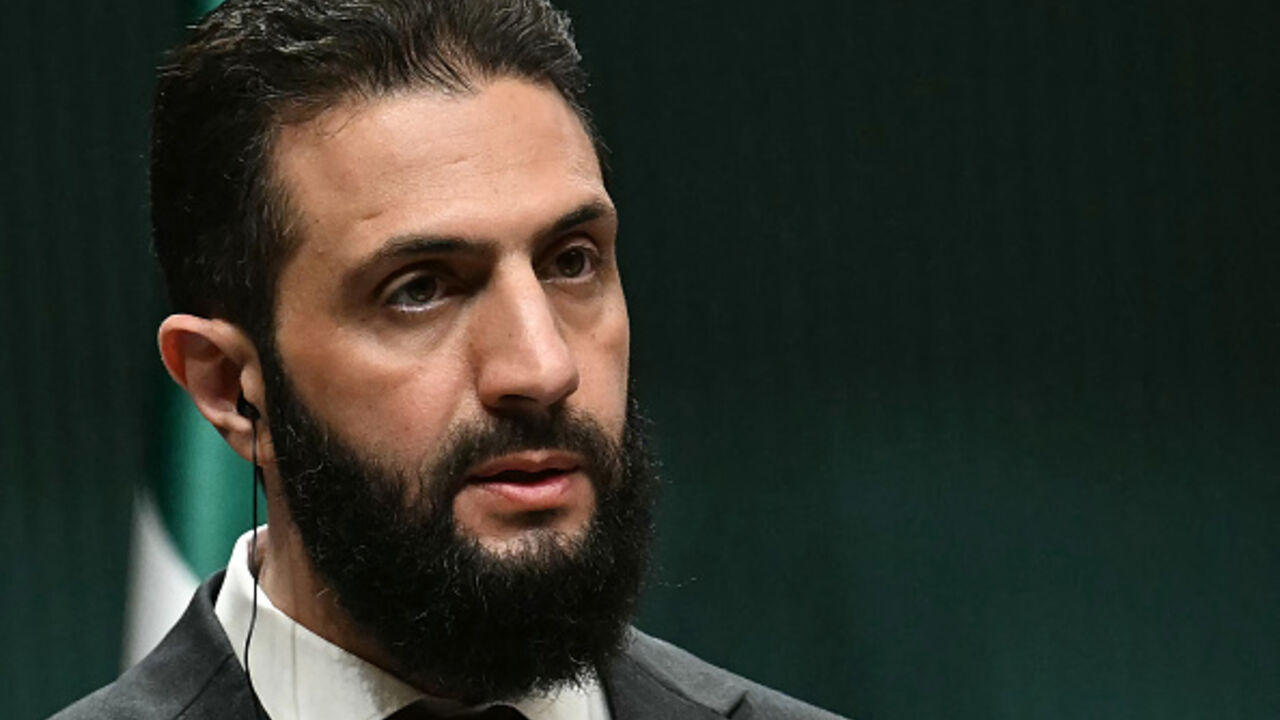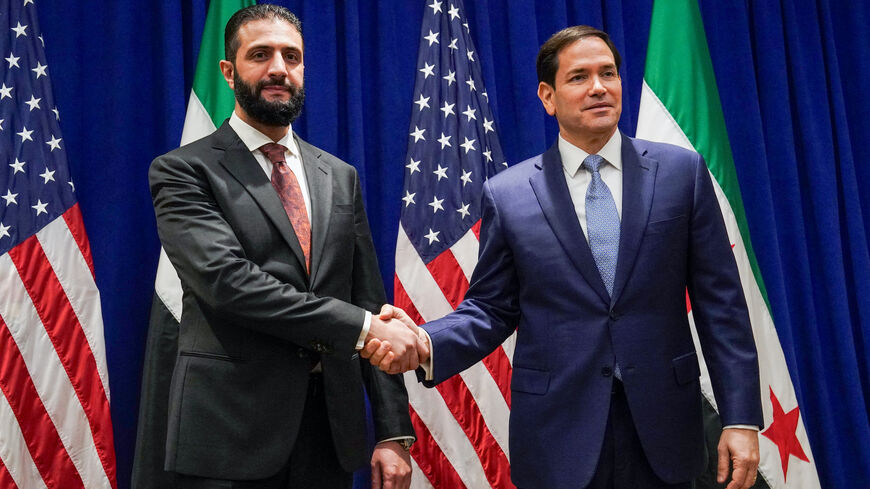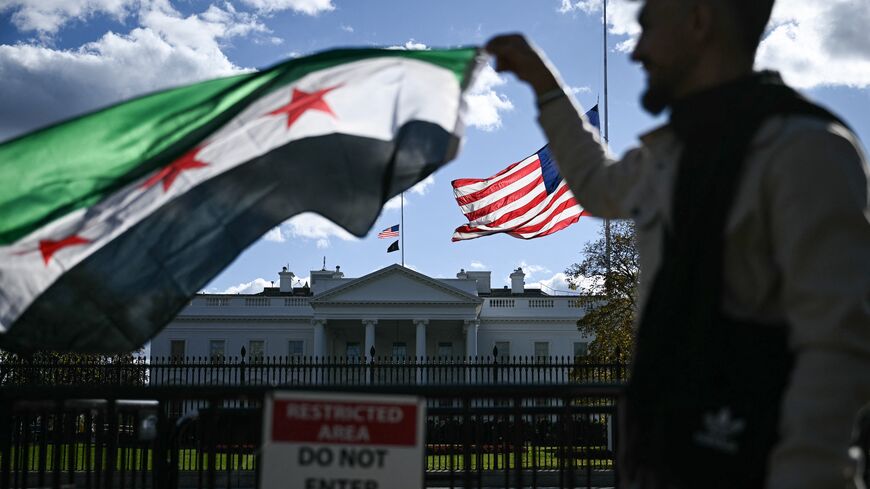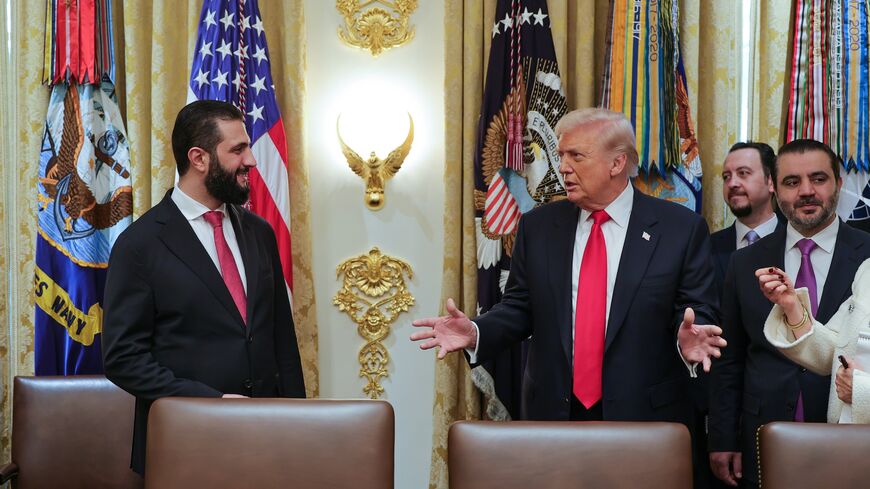Syria's Sharaa says no direct talks with Israel, open to US military presence
In an interview on Monday, President Ahmed al-Sharaa dismissed direct negotiations with Israel concerning the Abraham Accords, but left the door open to US-brokered diplomacy.

Syrian President Ahmed al-Sharaa said Monday that his ties to al-Qaeda are “a matter of the past,” emphasizing that he did not play any role in 9/11 despite his past affiliations. He added that his country is “entering a new era” in its relationship with the United States, including openness to US-brokered diplomacy on normalization with Israel.
The comments aired during an interview with Fox News’ Gillian Turner at 6 p.m. EST during Sharaa’s landmark visit to Washington — his first since taking power late last year after his Islamist group, Hayat Tahrir al-Sham, toppled longtime ruler Bashar al-Assad. His trip marks the first time a sitting Syrian leader has visited the White House.
On Monday, Sharaa met with Trump at the White House. After the meeting, Trump struck an optimistic tone. “We want to see Syria become a country that's very successful,” he told reporters. “And I think this leader can do it. I really do.”
In the interview, Sharaa distanced Syria from other Arab states that have normalized relations with Israel under the Abraham Accords. A readout from the Syrian Foreign Ministry said that the American side "affirmed its support for reaching a security agreement with Israel aimed at enhancing regional stability."
“The situation in Syria is different from the situation of the countries who went on with the Abraham Accords,” he said. “Syria has borders with Israel and Israel has occupied the Golan since 1967,” referring to the Golan Heights, a strategic plateau in Syria seized by Israel during the Six-Day War and annexed in 1981. Israel's annexation has not been recognized by the vast majority of the international community, though the Trump administration formally recognized Israeli sovereignty over the territory during his first term.
Potential Israel rapprochement
While ruling out any immediate, direct talks with Israel, Sharaa left open the possibility of US-brokered diplomacy, saying, “We are not going to enter into direct negotiations right now. Maybe the United States’ administration, with President Trump, will help us reach this kind of negotiation.”
His comments come as the Trump administration pushes to expand the Abraham Accords. Just last week, Trump announced that Kazakhstan has agreed to join, though the move is largely viewed as symbolic given that the country has had relations with Israel since 1992.
After Trump and Sharaa met in Riyadh in May, Trump said that he told the Syrian leader, "I hope you're going to join [the Abraham Accords] once you're straightened out." According to Trump, Sharaa said yes.
Sharaa also addressed one of the most sensitive questions surrounding his new government: the fate of former ruler Bashar al-Assad. His remarks followed a visit to Moscow last month, during which he met with Russian President Vladimir Putin and reportedly requested Assad's extradition. Russia, Assad’s primary military backer during Syria’s civil war, maintains three military bases in Syria, its only official military outposts in the Middle East. The Tartous naval base provides Russia’s sole access to the strategic Mediterranean Sea.
Sharaa said that part of the negotiations with Russia involved returning wanted individuals to Syria, including Assad, and said, “The Russians have a different opinion," adding, "However, justice must prevail.”
During Sharaa’s visit, Damascus agreed to join the US-led coalition against the Islamic State. The agreement expands intelligence cooperation between the two countries but stops short of establishing a direct military partnership. Asked about his past affiliation with al-Qaeda — from which ISIS emerged — and whether he discussed it with Trump, Sharaa dismissed the issue as “a matter of the past,” saying the talks focused instead on “the future and investment opportunities in Syria’s future.”
The interviewer also asked whether Sharaa felt regret over al-Qaeda's Sept. 11, 2001 attacks, which killed almost 3,000 people. Sharaa said, "I was only 19 years old … and didn't have any decision-making power at that time, and I don't have anything to do with it. … So you're speaking to the wrong person about this subject. We mourn for every civilian that got killed."
Future of US military presence in Syria
Sharaa signaled his government’s readiness to work with Washington on counterterrorism in coordination with Syrian authorities. “There are reasons for the presence of the United States military in Syria,” he said, adding that the US presence, which is largely concentrated in the country's northeast, “needs to be with the coordination with the Syrian government … so we need to discuss these matters and get into an agreement about ISIS.”
In late December 2024, the Pentagon said it had fewer than 2,000 US troops in Syria, including about 900 on long-term deployments and roughly 1,100 in “temporary rotational” status. In April, the Pentagon said that it planned to reduce that number to less than 1,000 "in the coming months." ISIS no longer holds territory in Syria but continues to operate as an insurgent network and carry out attacks.
Sharaa also addressed the case of missing American journalist Austin Tice, who disappeared near Damascus in 2012 while covering the country’s civil war. Tice vanished after being stopped at a checkpoint outside Damascus. He is one of several Americans believed to have been detained by Syrian authorities during the war. Referring to Tice’s mother, Debra, who he met with in January, Sharaa said, “I'm going to do everything in my power so that she can have important and enough information about her son — her and the other US citizens, all the other people who have been lost in the past several years.”
Last month, a group of former US detainees in Syria and relatives of missing Americans wrote to Congress urging a full repeal of the Caesar Syria Civilian Protection Act, citing its restrictions on aid and investigative efforts. Enacted in 2019, the Caesar Act imposes broad sanctions on the Syrian government and affiliated entities. Although the Trump administration has issued two waivers for Syria, fully repealing the act would require approval from both the House and Senate.







